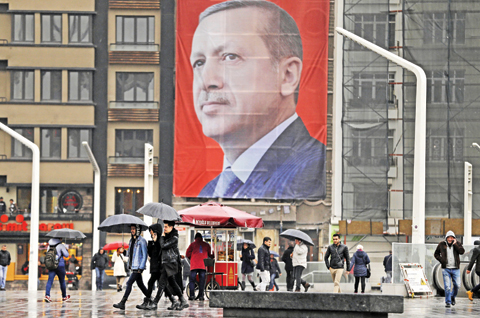Greece to ask for NATO support over Turkish-Libyan military agreement
ANKARA: Turkey is not blackmailing NATO with its rejection of a defense plan for the Baltics and Poland, and has full veto rights within the alliance, a Turkish security source said yesterday ahead of a NATO alliance summit in London. Reuters reported last week that Turkey was refusing to back a NATO defence plan for the Baltics and Poland until it received more support for its battle with the Syrian Kurdish YPG militia, which it views as a terrorist organization.
Ankara has said the impasse was caused by the United States withdrawing support from a separate defense plan for Turkey, covering any possible attack from the south where it borders Syria, and that it wanted the issue resolved. "NATO is an institution where Turkey has full veto rights, politically and militarily, and there are procedures here," the source said. "There is no such thing as Turkey blackmailing - a statement like that is unacceptable."
A diplomatic source told Reuters last week that Turkey was "taking eastern Europeans hostage" by blocking approval of the military planning, and a second source call Ankara's behavior "disruptive". NATO envoys need formal approval by all 29 members for the plan to improve the defense of Poland, Lithuania, Latvia and Estonia against any threat from neighboring Russia. A Turkish diplomatic source later said Turkey was "open to offers", and that NATO Secretary-General Jens Stoltenberg was trying to find common ground between the allies.
However, relations between Turkey and its NATO allies have been strained over a host of issues ranging from Ankara's decision to procure Russian air defense systems to Syria policy. Several NATO members condemned Turkey's decision last month to launch an offensive into northeastern Syria against the YPG. Turkey, which has NATO's second largest military, wants the alliance to formally classify the YPG, the main component of the U.S.-backed Syrian Democratic Forces (SDF), as terrorists. It has been infuriated over the support NATO allies have given the YPG, a Western partner in fighting Islamic State militants.
Last week, Turkish Foreign Minister Mevlut Cavusoglu accused French President Emmanuel Macron of sponsoring terrorism in his support for the YPG, after Macron said Turkey should not expect solidarity from NATO after its Syria incursion. Macron has also criticized NATO ahead of the summit, saying the alliance was experiencing a "brain death". Turkish President Tayyip Erdogan lambasted his remarks on Friday, telling the French leader to "check whether you are brain dead."
Meanwhile, Greece will seek support from NATO at the summit in London this week following a military deal signed by Turkey and Libya's UN-recognized government, Greek Prime Minister Kyriakos Mitsotakis said on Sunday. Erdogan met with the head of the Tripoli-based Government of National Accord (GNA), Prime Minister Fayed Al-Sarraj, on Wednesday to sign agreements on security and military cooperation, as well as maritime jurisdictions.
The agreements have also raised hackles in Egypt and Cyprus, according to the UN's Libya envoy Ghassan Salame. "An alliance cannot remain indifferent when one of its members openly violates international law and aims (to harm) another member," Mitsotakis said in a speech to his New Democracy party on Sunday. Greece last week expressed its dissatisfaction with the accord and summoned the ambassadors of Turkey and Libya in Greece to ask for information on its content.
Greek Foreign Minister Nikos Dendias on Sunday met his Egyptian counterpart Sameh Choukry in Cairo to discuss the matter. The deal comes despite calls from the Arab League - which includes Libya - to end cooperation with Turkey in protest of its military offensive against Kurdish forces in Syria last month. Libya has been mired in chaos since a NATO-backed uprising that toppled and killed dictator Muammar Gaddafi in 2011.
Saudi Arabia, Egypt and the UAE back Khalifa Haftar, a military strongman in eastern Libya who launched an offensive in April in a bid to seize Tripoli from fighters loyal to the GNA. Turkey and Qatar openly support his rival Sarraj. Located in the southeastern Mediterranean, Greece - a NATO member like Turkey - maintains a delicate relationship with its neighbor, which has become a gateway to Europe with thousands of asylum-seekers flocking to the Greek islands. - Agencies










